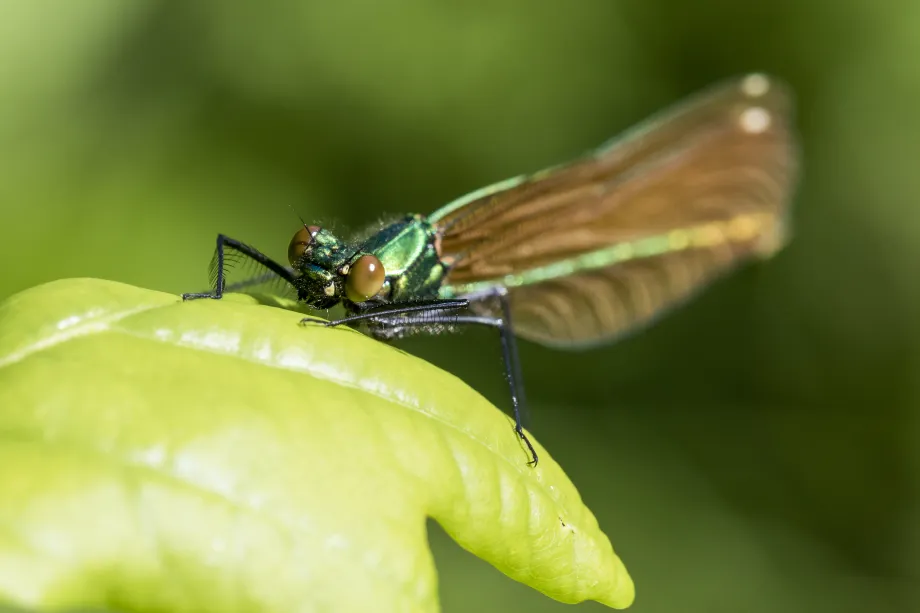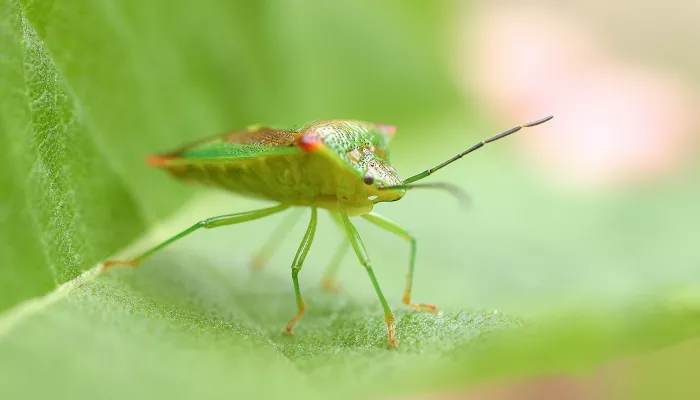
Female Beautiful Demoiselle ©Chris Lawrence
The results from the Bugs Matter surveys inform a growing requirement for conservation research, policy and practice targeted at insects. This year the survey will launch in Ireland with other countries planned for 2026 and beyond, meaning citizen scientists across the planet will be taking part to compile a hugely valuable global dataset.
Participation in the 2024 Bugs Matter survey in Kent was fantastic: the number of journeys recorded by citizen scientists was almost twice that in 2023, with several dedicated individuals recording hundreds of journeys each. It is hoped that the survey will continue to grow each year.
Dr Lawrence Ball from Kent Wildlife Trust said: "We are pleased that so many citizen scientists in Kent have signed up to the Bugs Matter app - more than in any other county! The data we’re generating means that for the first time we can get a county-wide estimate of how insect populations are changing over time. The results from these first few years are concerning, but we need more citizen scientists to record more journeys across more of our road network every year, to understand the long-term trends in insect numbers in Kent."
The 2025 Bugs Matter survey season will begin on the 1st May. Those keen to get involved can download the free Bugs Matter app now to sign up for next year’s survey:
Editors notes
- Bugs Matter is grateful for recent funding from the RSPB, Openreach and AWS.
- Website: The national citizen science survey
Bugs Matter 2024 summary:
- 8,828 journeys made in total during 2024 (6,081 retained for analysis)
- 25,615 journeys in the complete Bugs Matter dataset since 2021 (17,681 retained for analysis)
- 473,330 miles covered by journeys since 2021
- 651 new Bugs Matter App users in 2024
- The number of insects sampled on vehicle number plates across the UK decreased by 62.5% between 2021 and 2024
- The number of insects sampled on vehicle number plates in England decreased by 62.0% between 2021 and 2024
- The number of insects sampled on vehicle number plates in Wales decreased by 64.2% between 2021 and 2024
- The number of insects sampled on vehicle number plates in Scotland decreased by 65.2% between 2021 and 2024
- The number of insects sampled on vehicle number plates in Northern Ireland decreased by 55.4% between 2021 and 2024
The survey is based on the 'windscreen phenomenon', a term given to the anecdotal observation that people tend to find fewer insects squashed on the windscreens of their cars now, compared to the past.
Counting insects not only gives an estimate of the abundance of insect life in our towns and countryside but also a measure of the health of our environment. Insects are essential to supporting and maintaining a healthy environment, so when their numbers fall, that is an indication that nature is in trouble.
Insect numbers can also show where wildlife is recovering and so Bugs Matter can be used to measure how the work of conservation organisations and others is helping nature's recovery.
There are many ways in which people can help reverse insect declines:
Using alternatives to peat can help protect important wildlife habitats and reduce CO₂ emissions
Put away the spray - by eliminating our use of pesticides, we can stop the decline of thousands of insects in an instant.
Be less tidy in your garden - you can help insects by letting the grass grow longer and sowing wildflowers. If every garden had a little patch for insects, collectively it would probably be the biggest area of wildlife habitat in the world.
Watch your footprint - climate change is a growing threat to a wide range of wildlife, including insects. Reducing meat intake and car journeys are the most effective actions you can take.
Join an organisation such as Buglife or your local Wildlife Trust. Charities like these do vital work to protect and restore our most important wildlife sites, restore lost habitats at scale and reconnect our countryside through initiatives like B-Lines, as well as lobby the government for stronger environmental laws.
About Kent Wildlife Trust
Kent Wildlife Trust is the county's leading conservation charity with more than 32,000 members and over 1000 registered volunteers. We manage and protect over 9000 acres of land across more than 80 different sites and nature reserves, alongside 3 visitor centres. We work closely with local communities, landowners, and partners to protect and improve habitats in the countryside, coast, and town for the benefit of the wildlife and people of Kent. The charity also campaigns against inappropriate and damaging development; and educates and inspires young people to help secure a more sustainable future and create a Wilder Kent. Visit our website here: kentwildlifetrust.org.uk
About Buglife
Buglife is the only organisation in Europe devoted to the conservation of all invertebrates our aim is to halt the extinction of invertebrate species and to achieve sustainable populations of invertebrates. Invertebrates are vitally important to a healthy planet – humans and other life forms could not survive without them. The food we eat, the fish we catch, the birds we see, the flowers we smell and the hum of life we hear, simply would not exist without bugs. Invertebrates underpin life on earth and without them the world’s ecosystems would collapse. buglife.org.uk

